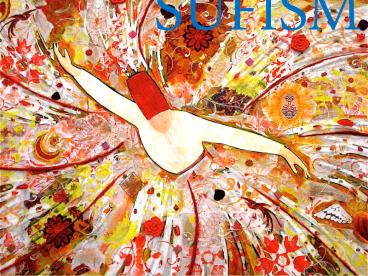SUFISM - PowerPoint PPT Presentation
Title:
SUFISM
Description:
SUFISM and its importance – PowerPoint PPT presentation
Number of Views:1230
Title: SUFISM
1
- SUFISM
2
(No Transcript)
3
MEANING
- The substance of Sufism is the Truth and the
meaning of Sufism is the selfless experiencing
and actualization of the Truth. The practice of
Sufism is the intention to go towards the Truth,
by means of love and devotion. This is called
the tarigat, the spiritual path or way towards
God. The sufi is one who is a lover of Truth,
who by means of love and devotion moves towards
the Truth, towards the perfection which all are
truly seeking. As necessitated by love's
jealousy, the sufi is taken away from all except
the Truth.
4
Cont
- Islamic mysticism is called ta?awwuf (literally,
to dress in wool) in Arabic, but it has been
called Sufism in Western languages since the
early 19th century. An abstract word, Sufism
derives from the Arabic term for a mystic, ?ufi,
which is in turn derived from ?uf, wool,
plausibly a reference to the woolen garment of
early Islamic ascetics. The Sufis are also
generally known as the poor, fuqara?, plural of
the Arabic faqir, in Persian darvish, whence the
English words fakir and dervish.
5
(No Transcript)
6
ORIGIN
- Sufism is as old as humanity. Sufi saints existed
even before Prophet Muhammad, but before the
Prophet they were not called Sufis. It was only
after a few centuries that they were called
Sufis. According to Qushayri (988 AD) and some
other scholars like Shihabuddin Suhrawardi, the
term Sufi was first used at the end of second
century Hijri i.e. in the early ninth century AD.
The term Sufi did not find a mention either in
the Sihah-i-Sittah compiled in the 9th and 10th
century AD or in the Arabic dictionary, the Qamus
compiled in the early 15th century AD. It is
believed that a large number of prophets of God
preceded Prophet Muhammad. In Islamic traditions,
the number of prophets is put at 124,000 and that
of messengers of God at 313. The early prophets
were monotheists and they brought the message of
the one true God. The pre-Islamic monotheists are
believed to exist widely amongst Arab tribes from
about the fifth century AD. They did not believe
in idol worship and openly disapproved of
idolatry and desired to restore the religion of
Abraham. They were the seekers of Truth, who
engaged themselves in the search of Truth and
believed in the unity of the Supreme Being. They
laid a lot of stress on ones own conduct living
a moral life compassionate and sympathetic
behavior with others
7
Cont
- The very early period of Islam witnessed it as a
religion of reconciliation and concord with
people being gently persuaded rather than being
coerced into it. However, the infidelity and
impious rule of the Umayyad immediately following
the first four caliphs, created such political
and social conditions that many Muslims became
disgusted and adopted to asceticism and a life of
seclusion to seek peace of soul. Gradually the
focus shifted from material wealth to the lack of
desire for possession i.e. a true detachment from
all worldly things. Most of them were, however,
orthodox Muslims in their beliefs and practices.
They had yet not distinguished spirituality from
the religion and laid great emphasis on the
teachings of Quran and Traditions.
8
Cont
- The Sufis in the period immediately after Prophet
Muhammad spent their lives in fasting and in
observing the rules of Sharia (the Islamic code
of conduct), giving up the worldly
pleasures-wealth, fame, feasts and women-and
spent their time in solitude away from the
society, seeking anonymity, hunger and celibacy.
They usually lived on scanty food and wore little
clothes. They were more concerned with the
punishments and rewards for the infidels and the
believers. In the ninth century AD, however, the
Sufis recognized that spiritual progress couldnt
be achieved by following Sharia alone. It was
necessary for guiding their conduct, but not
enough. They started adopting various spiritual
practices over and above Sharia, known
as Tariqat (the path). They considered
following Shariat andTariqat essential to reach
the Haqiqat (the Truth).
9
(No Transcript)
10
Principles And Practices
- The Sufis are the men of the highest morality.
They are the people who behave according to the
need of the time. They are not bound by the
shackles of rituals and customs. Religion for
them is important only so long as it does not
hinder spiritual progress. The greatest religion
for them is the love for the humanity and not to
hurt anyones feelings. Their objective being to
evolve as a complete man by improving ones
character and conduct the principles and
practices adopted by them revolve around these
central ideas and are to be seen in this
light. A Sufi seeker has to complete his journey
to self-realisation. He has to find his Beloved
within himself, for He can be found only in a
heart that has been purified by the fire of love.
The distance, however, can be covered in a
moment, the Truth can be realized in a moment, if
one wants it as desperately as a drowning man
wants the air.
11
Cont
- The basic principles of Sufism were given by
Abdul Khaliq al-Ghujdawani, who was one of the
greatest Sufi Masters of the Naqshbandi Sufi
Order. Till about the 6th Century Hijri, the
Sufis practised loud dhikr (jikr, japa or
remembrance) i.e. they used to recite the name of
the Almighty loudly by tongue.Eight Principles
were embraced and hailed by all the
forty tariqats (Sufi Orders) as the way of Truth
and loyalty.(i) Hosh dar Dam (Conscious
Breathing)(ii) Nazar bar Kadam (Watch Your
Step)(iii) Safar dar Watan (Journey
Homeward)(iv) Khilawat dar Anjuman (Solitude in
the Crowd)(v) Yad Kard (Essential Remembrance)

